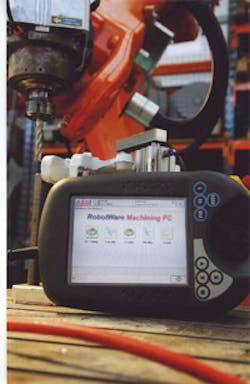Robots Sense Their Surroundings
Traditionally, foundryfinishing processes can be extremely labor-intensive and have inconsistent end-product quality because casts are usually ground, deburred and polished by hand.
Until now, robots used for this task have been position controlled, moving according to defined positions and speeds. But if the robot is struggling to trace a programmed path, the robot’s servo will increase power until maximum torque, resulting in a collision with the excess material along the way.
As a result, the robot stops, the tool breaks or the workpiece is damaged. To limit such damage, shops often run conventional castcleaning robots at slower speeds, but doing that reduces productivity.
This conventional approach also requires complex and time-consuming programming as the robot path needs to be as exact as possible. The expectation is that the grinding or polishing will deliver consistent results. In reality, the cast products are all individual with different tolerances, and this generates inconsistent process results.
A new dedicated robotbased system, called Force Control Machining from ABB Automation Technologies AB, eliminates these challenges and the bottlenecks associated with traditional finishing processes.
The system is designed to improve part quality, reduce programming time, speed part deburring cycle times and increase tool life. It provides force control for machining applications in which a robot needs to be sensitive to process forces. At the heart of ABB’s system are two advanced software features – FC Pressure and FC SpeedChange.
FC Pressure is aimed at processes that demand highquality surface finishes. It allows a robot to effectively “feel” its surroundings and follow the casting surface, changing its position to apply a constant pressure on the surface, even if the exact position of the surface is unknown. This consistent contact removes debris, such as burrs, at the same depth, and such force control accuracy delivers good surface finishes, even where a 5 Newton force difference can hugely impact final quality.
This feature adjusts the robot’s path to maintain a consistent pressure. It is especially well-suited for polishing, grinding and cleaning surfaces that need to be even and smooth such as with water taps, turbines/ propeller blades, electronic parts and automotive components.
For processes in which path accuracy is important and finished results must comply with specific dimensions, the FC SpeedChange feature controls the robot so that it follows a programmed path to maintain a constant materialremoval rate.
This feature operates at maximum process speed and automatically slows a robot when the machining forces climb too high. This eliminates part and tool damage due to stress and heat, shortens cycle times, allows shops to handle variations in castings, and to predict tool wear.
For full functionality, ABB’s robotbased system contains standard ABB robots fitted with force sensors; ABB’s IRC5 controller that houses an interface card linking the sensors to the controller’s computer; and cabling between the sensors and controller. The system’s force sensor measures the process forces used to adjust the robot’s behavior. For FC Pressure, either a six degree of freedom (6DOF) – that is full force and full torque – or a 1DOF force sensor is used.
For FC SpeedChange, either a 6DOF sensor or an analog signal that represents the machining forces, such as spindle voltage output, are used. The choice of sensor input depends on the required flexibility of the application.
“This ABB solution is fully flexible and can be adopted to almost any machining process or system configuration as required by the customer,” said Andreas Eriksson, product manager foundry, ABB Robotics.
All the benefits of Force Control Machining open up a huge potential for increased productivity and higher quality using robot automation.”
